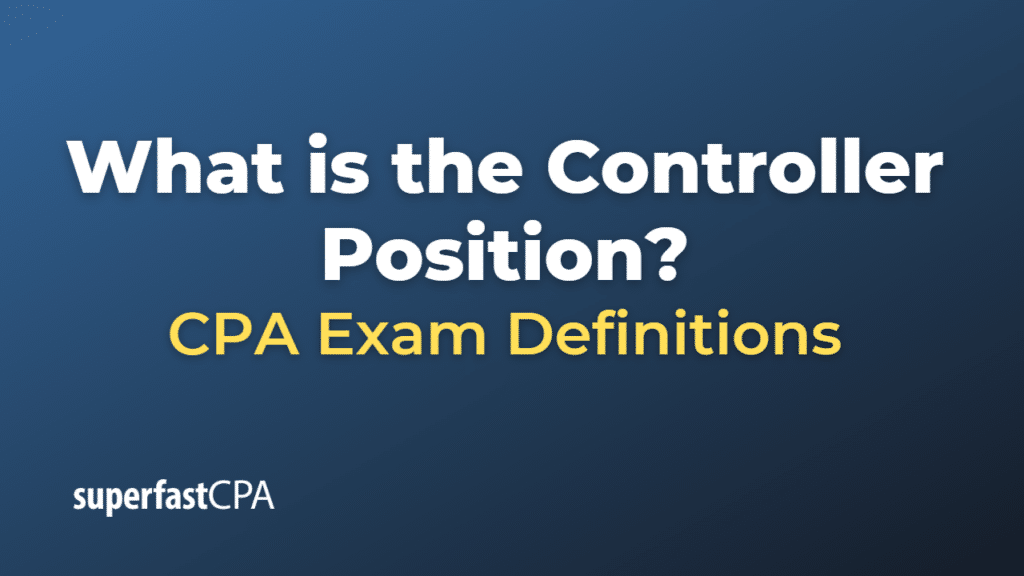Controller Position
The controller position, also known as a financial controller or comptroller, is a senior-level role within an organization’s finance and accounting department. The controller is responsible for overseeing the financial reporting, accounting, budgeting, and internal controls of the company. They play a crucial role in ensuring the accuracy and integrity of the company’s financial information and safeguarding its assets.
Key responsibilities of a controller typically include:
- Managing the financial reporting process: The controller oversees the preparation of financial statements, such as income statements, balance sheets, and cash flow statements, ensuring that they are accurate, complete, and in compliance with Generally Accepted Accounting Principles (GAAP) or International Financial Reporting Standards (IFRS).
- Implementing and maintaining internal controls: The controller is responsible for establishing and maintaining a robust system of internal controls to safeguard the company’s assets, prevent fraud, and ensure the reliability of financial reporting.
- Budgeting and forecasting: The controller participates in the budgeting process, working with other departments to develop and analyze budgets, monitor financial performance, and identify variances.
- Tax compliance and planning: The controller ensures that the company meets all tax filing and reporting requirements, while also working on tax planning strategies to minimize tax liabilities and optimize the company’s financial position.
- Managing the accounting team: The controller typically supervises the accounting staff, providing guidance, training, and support to ensure that accounting activities are performed accurately and efficiently.
- Financial analysis and decision support: The controller provides financial analysis and insights to support management decision-making, helping to evaluate the financial implications of various business initiatives and strategies.
- Audit coordination: The controller serves as the primary liaison with external auditors, facilitating the annual audit process and ensuring that audit requirements are met.
The specific duties and responsibilities of a controller may vary depending on the size and complexity of the organization. In larger organizations, the controller often reports to the Chief Financial Officer (CFO) and focuses primarily on accounting and financial reporting, while the CFO is responsible for broader financial strategy and management. In smaller organizations, the controller may assume a broader range of financial responsibilities, including some that would typically fall under the CFO’s purview.
Example of the Controller Position
Let’s consider a hypothetical example of a medium-sized manufacturing company that hires a new controller to manage its finance and accounting department.
Upon joining the company, the controller takes on the following responsibilities:
- Financial reporting: The controller reviews and finalizes the company’s monthly, quarterly, and annual financial statements, ensuring their accuracy and compliance with accounting standards. They also present these financial reports to the company’s senior management and board of directors, providing explanations and insights on the company’s financial performance.
- Internal controls: The controller conducts a thorough review of the company’s existing internal controls and identifies areas for improvement. They implement new controls and procedures to enhance the accuracy and reliability of financial reporting and safeguard the company’s assets from fraud and misuse.
- Budgeting and forecasting: Working closely with the company’s various departments, the controller leads the annual budgeting process, setting revenue targets, and allocating resources. They also develop financial forecasts to help management anticipate future financial performance and make data-driven decisions.
- Tax compliance and planning: The controller ensures that the company complies with all applicable tax regulations, filing timely and accurate tax returns. They also work with external tax advisors to develop tax strategies that minimize the company’s tax liabilities.
- Managing the accounting team: The controller oversees the company’s accounting staff, providing guidance and support to ensure the team performs its duties accurately and efficiently. They also identify training needs and opportunities for staff development.
- Financial analysis and decision support: When the company considers a significant capital investment, such as purchasing new machinery or expanding production capacity, the controller conducts a financial analysis to assess the potential return on investment and the impact on the company’s financial position. They present their findings to the senior management team, helping them make informed decisions.
- Audit coordination: The controller works closely with the company’s external auditors during the annual audit process, providing them with the necessary information and documentation. They also address any issues or concerns raised by the auditors and implement corrective actions as needed.
By fulfilling these responsibilities, the controller plays a critical role in the company’s financial management, helping to ensure its long-term success and stability.












